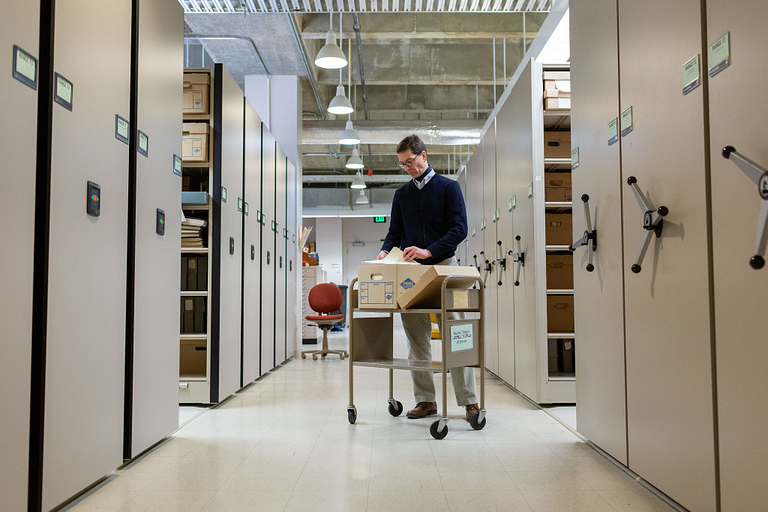
Nestled in the lower level of University Library, the Ruth Lilly Special Collections and Archives has been an IUPUI 50th Anniversary hot spot.
With tall ceilings, retractable shelves for optimal space-saving, and a temperature- and humidity-controlled atmosphere, the archives are the go-to for decades-old photographs, data and documentation of early IUPUI planning.
“Our job in the archives is to collect administrative, historical and legal records that have long-term or permanent value for the university,” said Stephen E. Towne, associate university archivist. “We do this for a variety of reasons – one, to know what the university has done in the past and build on the future. Two, people want to study this institution historically, so they come here to do research.”
The collection is always growing, with boxes of letters, memos, reports and blueprints received every year. The latest includes work from Harris Wofford, the former senator and close advisor to Martin Luther King Jr. and President John F. Kennedy.
Description of the following video:
[Video: Close-up on a fan-like device whirling against a beige background.]
[Title: IUPUI Presents appears in the upper-left corner, along with the IU trident]
[Video: Shot pans out to reveal the device is a wheel on the side of a shelving unit that moves the unit apart to reveal its contents in the IUPUI Archives]
Stephen E. Towne speaks in voiceover as he is shown taking a box from the shelving unit and walking it to a table: Our job in the archives is to collect records of administrative, historical, legal and other value. …
[Video: Close-up on labels on containers on the archive shelf, such as “A93-43, University Theatre Productions, Calendar year 1990 to 1993, Includes The Glass Menagerie”]
[Video: Close-up on Towne’s gloved hands sifting through the files in the box]
… And that have permanent value or long-term value for the university.
[Title appears: Stephen E. Towne, Associate university archivist]
[Towne speaks on-camera: So, our records go back into the 19th century. And we make them available …
[Video: Towne presses a button, causing a loud beep, to move more shelving units. He continues speaking in voiceover: … to people who come down to the archives to do research. Included with lots of records in these boxes are many photographs.
[Video: A person working with an image-scanning device and a computer]
Towne continues in voiceover: In fact, I think photographs are probably our most popular stuff. [Video: Towne showing pages of photo films in a manila folder
Towne speaks: People want to see photographs of themselves or of other people that they knew, or places or events, and we get those out for them.
[Video: Towne holds up a photo of a building and speaks: And this is where Maynard Hine had his offices for a while. This building no longer exists. It was torn down in 1984.]
[Video: Towne points to various places on an aerial photo of the area: Wishard Hospital down here, and this is Fall Creek. This is Indiana Avenue going up to 16th Street.]
[Video: Towne holds another photo of some men at a dinner, wearing suits and ties: Chancellor Glenn Irwin there on the left, with someone I don’t recognize. But in very dashing 1970s attire.
[Video: A shot looking down one of the many aisles in the archives.]
[Towne speaks while putting the archival box back in place: Someone is looking for a specific file from a specific meeting. Sometimes we can get, well, not sometimes – we will find it for them.
[Video: Various shots of the archives and the office space]
Towne speaks in voiceover: It’s a good space because it has very constant temperature and humidity. And the CFS people are very good at making sure that it stays constant because archival collections can be damaged when there’s humidity and temperature fluctuation.
[Video: Towne appears onscreen]
People are welcome to come and use our stuff to document IUPUI …
[Video: screen fades to black]
Towne speaks in voiceover: … the city and all of the great things that the university has been part of.
[Titles appear: IUPUI, Fulfilling the promise, iupui.edu]
The archives are open to IUPUI faculty, staff and students for research purposes. Just contact the office and get to work in the reading room.
More than 50 years
While IUPUI just celebrated its official 50th birthday on Jan. 24, programs go well before 1969. Records from the IU School of Medicine, the School of Health and Human Sciences, and the School of Nursing have roots reaching back more than 100 years ago.
Records recent and old are stored in boxes, which contain meticulously labeled manila folders. The aisles are organized in broad categories: IUPUI faculty, School of Medicine, and so on. The shelves open at the push of a button or the twist of a wheel.
‘Hine’s Quarters’
Towne said most users of the archives seek old photographs. Early shots of campus, head shots of IUPUI’s founders and images that display IUPUI’s growth are popular. Some photos have amusing stories. An exterior of a small building, for example, could have an amazing story behind it. Take a small office that once stood at 1219 W. Michigan St., near what are now School of Dentistry parking lots.

“This is where the first IUPUI chancellor, Maynard Hine, had his offices for a while,” Towne explained. “It was a Curley’s Cleaners, and it had various nicknames – ‘Hine’s Quarters’ and then ‘The Ex-Chancellery’ because Hine occupied this building after he resigned as chancellor.”
Plater’s memos
William Plater, a longtime executive vice chancellor and dean of the faculties, left a lasting impression on IUPUI during his tenure from the 1980s into the 2000s. He transferred his copious records to the archives after his retirement in 2006. Plater’s legacy is still vital in the form of awards and honors. For events and other work, he likes to utilize the archives and reference his writings from 30 years ago.
“We have a wall here, about 300 feet of his stuff, along with his predecessors and successors,” Towne said. “We know what the contents are of these boxes, and we can find files very quickly. Bill Plater will contact us and say something like, ‘I remember a memo I wrote in 1989 about such and such, and I think I wrote it in October.’ Sure enough, we find it, and we send a copy to Bill Plater.”
Origin of IUPUI hoops
The IUPUI men’s basketball team is having a competitive season in the Horizon League, an NCAA Division I conference that awards the champ a trip to March Madness.
Photo Caption Contest
When IUPUI started 50 years ago, it didn’t immediately field a basketball team to take on Division I opponents. Thanks to archival research, Towne discovered that it took a March 6, 1971, tournament invite of regional schools at Indiana University Kokomo to get a team organized.
“Then-intramurals director Nick Kellum, later dean of the School of Physical Education, took the winning intramurals team to Kokomo,” Towne said. “They came in third place – pretty good. Figuring that out was very interesting and significant because it was the beginning of intercollegiate athletics for IUPUI.”
While IUPUI is only 50 years young, the stories found in the archives are timeless.

